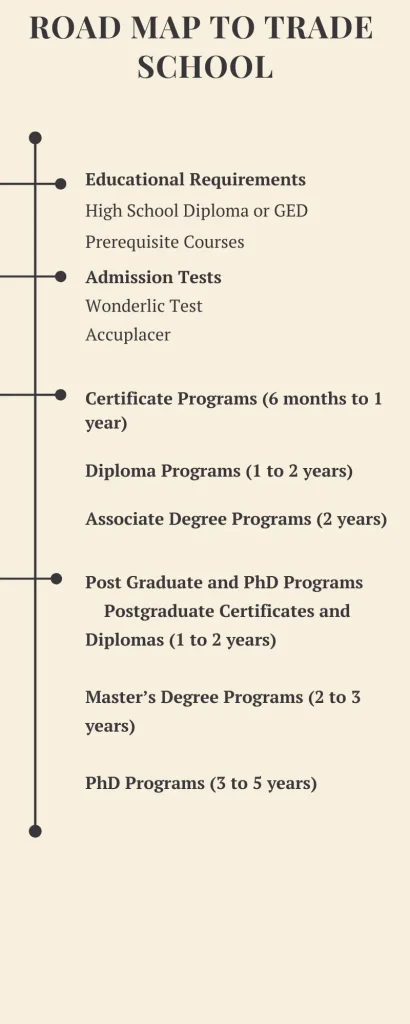Trade schools, also known as vocational schools, offer specialized education and training for specific careers. If you’re wondering “how long is trade school,” the answer varies depending on the program and field of study. Trade school programs are designed to provide hands-on experience and practical skills, preparing students for the workforce efficiently.
What is Trade School?
Trade schools focus on teaching the technical skills required for specific jobs. Unlike traditional colleges that offer broader educational experiences, trade schools are career-oriented. They provide targeted education that leads directly to employment in skilled trades such as plumbing, electrical work, automotive repair, and more.

In a trade school, students receive both classroom instruction and practical training. This combination ensures that graduates are ready to enter the workforce with the necessary skills and knowledge.
How Long is Trade School?
The duration of trade school programs can vary significantly based on the field of study and the level of expertise required. Here’s a breakdown of the typical timeframes for various programs:
Certificate Programs (6 months to 1 year)
Certificate programs are designed to provide quick entry into a specific trade. These programs focus intensively on practical skills related to the chosen field. For example, a certificate program in welding may cover welding techniques, safety procedures, and equipment use. Similarly, a culinary arts certificate program may include courses on cooking techniques, kitchen management, and food safety..
Diploma Programs (1 to 2 years)
Diploma programs offer a more comprehensive study of the trade compared to certificate programs. They typically last between one to two years and include a blend of practical training and theoretical coursework. For instance, a diploma in automotive technology might cover topics such as engine repair, electrical systems, and automotive diagnostics. Diploma programs aim to prepare students for entry-level positions with a deeper understanding of the trade..
Associate Degree Programs (2 years)
Associate degree programs in trade schools usually span two years and provide a well-rounded education combining practical skills and academic coursework. These programs are more extensive than certificate and diploma programs, often including general education courses alongside specialized training. For example, an associate degree in nursing may cover nursing fundamentals, patient care techniques, and clinical rotations in healthcare settings.

These programs are designed to be intensive and focused, allowing students to complete their education and enter the workforce more quickly than traditional four-year college programs.
How to Enter Trade School
Educational Requirements
Most trade schools require applicants to have a high school diploma or equivalent. Depending on the field of study, some programs may have additional prerequisites, such as specific coursework in math or science.
High School Diploma: Strong performance in science subjects such as Biology, Chemistry, and Physics.
Intermediate Degree: In many countries, an intermediate degree with a focus on pre-medical courses is required. This typically includes courses in Biology, Chemistry, Physics, and Mathematics.
Entrance Exams
Certain trade schools may require applicants to take entrance exams to assess their aptitude for the chosen field. Common tests include:
Wonderlic Test: Measures cognitive abilities and problem-solving skills.
Accuplacer: Assesses skills in math, reading, and writing.
Application Process
The application process typically involves submitting an application form, high school transcripts, and any required test scores. Some programs may also require a personal statement or letters of recommendation.
Financial Aid
Many trade schools offer financial aid options, including scholarships, grants, and loans. Prospective students should explore these opportunities to help fund their education.
Post Graduate and PhD Programs
While trade schools primarily focus on undergraduate programs, some institutions offer advanced training and specializations for those looking to deepen their expertise. Postgraduate programs are typically more specialized and can vary in length:
Postgraduate Certificates and Diplomas (1 to 2 years)
Advanced Welding Techniques: Focuses on complex welding methods and materials.
Cybersecurity: Advanced training in protecting computer systems and networks.
Project Management: Skills for managing large-scale projects, particularly in construction and engineering.
Master’s Degree Programs (2 to 3 years)
Master of Technology (M.Tech): Specializations in fields like renewable energy, robotics, and advanced manufacturing.
Master of Business Administration (MBA) in Trade Management: Focuses on business strategies and management skills for trade professionals.
PhD Programs (3 to 5 years)
PhD in Vocational Education: Research-focused programs that explore advanced teaching methods and curriculum development for trade schools.
PhD in Industrial Technology: Emphasizes innovation and research in industrial processes and technologies.
These advanced programs are designed for professionals seeking leadership roles or specialized expertise in their field.
Top 10 Trade Schools
Here is a list of the top 10 trade schools in the world, known for their excellent programs and diverse course offerings:

Massachusetts Institute of Technology (MIT), USA
Courses: Electrical Engineering, Mechanical Engineering, Computer Science
Stanford University, USA
Courses: Civil Engineering, Mechanical Engineering, Environmental Technology
Georgia Institute of Technology, USA
Courses: Aerospace Engineering, Biomedical Engineering, Computer Engineering
California Institute of Technology (Caltech), USA
Courses: Applied Physics, Bioengineering, Chemical Engineering
Technical University of Munich, Germany
Courses: Mechanical Engineering, Electrical Engineering, Informatics
Swiss Federal Institute of Technology (ETH Zurich), Switzerland
Courses: Architecture, Civil Engineering, Computer Science
University of Tokyo, Japan
Courses: Urban Engineering, Electrical Engineering, Materials Engineering
University of Cambridge, UK
Courses: Chemical Engineering, Information Technology, Mechanical Engineering
Nanyang Technological University, Singapore
Courses: Biomedical Engineering, Electrical and Electronic Engineering, Materials Science
Imperial College London, UK
Courses: Mechanical Engineering, Electrical Engineering, Chemical Engineering
Factors Affecting the Length of Trade School
The length of trade school can be influenced by various factors, including:
Program Type: Certificate, diploma, or associate degree programs each have different durations.
Field of Study: Different trades require varying amounts of training and education.
State Regulations: Licensing and certification requirements can vary by state or country.
Part-Time vs. Full-Time Enrollment: Part-time students may take longer to complete their programs.
Previous Experience: Students with prior relevant experience or education may complete programs faster.
Apprenticeship Requirements: Some trades require extensive apprenticeships, which can extend the total training time.
Specializations: Advanced or specialized certifications can add to the length of training.
Final Verdict
So, how long is trade school? The duration varies widely based on the program and specialization. Certificate programs can be completed in as little as six months, while associate degrees typically take around two years. Advanced programs may extend the timeframe further. Ultimately, trade school offers a quicker and more focused path to entering the workforce compared to traditional four-year degrees.
FAQs
1.How long does it take to complete a trade school program?
Trade school programs can range from 6 months to 2 years for certificates and diplomas, while associate degrees typically take about 2 years.
2.Can I attend trade school part-time?
Yes, many trade schools offer part-time programs, which can extend the duration but provide flexibility for working students.
3.Are there online trade school programs available?
Some trade schools offer online programs or hybrid courses that combine online and hands-on training.
4.What is the cost of attending trade school?
Costs vary widely based on the program and institution but are generally lower than traditional four-year colleges. Financial aid options are available.
5.Do trade schools provide job placement assistance?
Many trade schools have strong connections with industry employers and offer job placement services to help graduates find employment in their field.
